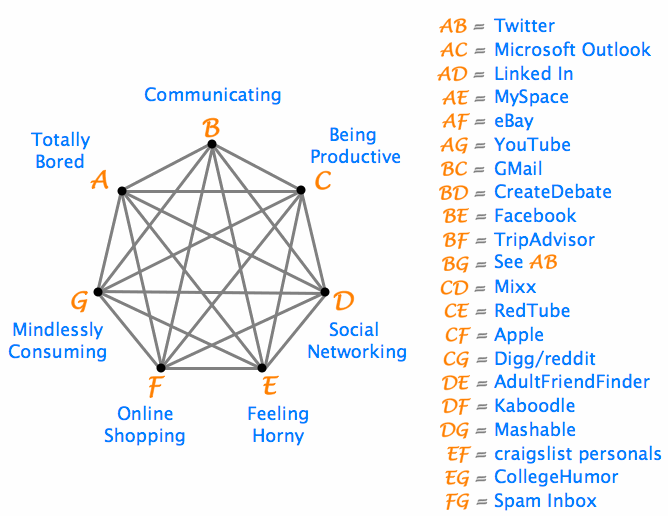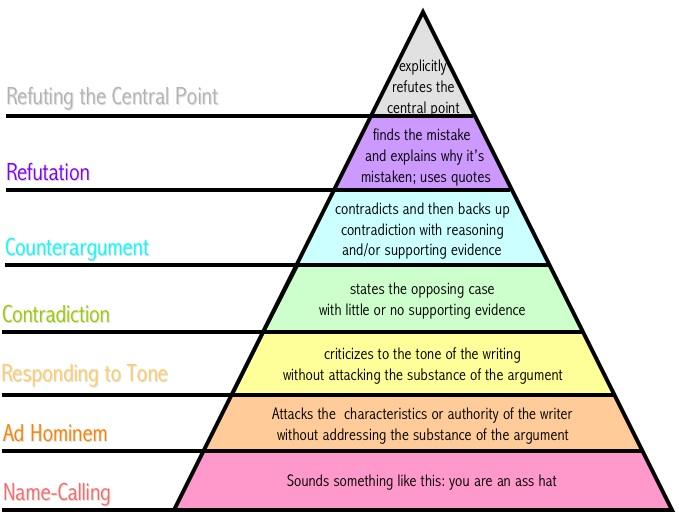Archive for the ‘Random Musings’ Category
Paul Graham’s Ladder of Disagreement
In March, Paul Graham wrote a great essay entitled How to Disagree. I loved the article because it is all about how the web is turning into a conversation (which is why we built CreateDebate). Shortly thereafter, I transformed Graham’s underlying thesis into a graphic to help illustrate his point. The original graphic (similar to Maslow’s Hierarchy of Needs) can be found here.
After reading the comments spurred by my illustration (on this blog and elsewhere), I decided it was time to revisit this graphic. In particular, this comment by Danielle Vyas caught my eye:
I arrived here via Stumble Upon and read the comments. I think that the chart would be more understandable if presented as a ladder instead of a pyramid. A lot of people relying on the visual representation with this post as one reader mentions without “reading”.
Paul Graham’s Ladder of Disagreement

I think she hit the nail on the head. Rather than illustrating the frequency of disagreements, this graphic illustrates the ascending quality of disagreements on the Internet. What do you think?
As always, if you found this analysis then you might enjoy using CreateDebate. We built our site from scratch and our community is growing quickly. Check it out!
The 7 Habits of Highly Effective Internet Users

If you found this analysis then you might enjoy using CreateDebate. We built our site from scratch and our community is growing quickly! A debate about The Seven Habits of Highly Effective Internet Users is already underway. Click here and check it out!
The Code of the Debater
Recently, I came across a debate handbook written by Alfred C. Snider of the University of Vermont. The complete text can be found here. I read through it with an eye for concepts that could be applied to online debate. One of the best takeaways was The Code of the Debater (albeit, its somewhat cheesy).
I’ve reprinted it below. In the web 2.0 world of user-generated content, I think that guidelines like these make a whole lot of sense. Whether you prefer to debate in the comments section of Digg, in the self subreddit or on CreateDebate, try to keep these guidelines in mind. You will be more effective in expressing your point and your reputation will improve.
For Myself:
- I will research my topic and know what I am talking about.
- I will respect the subject matter of my debates.
- I will choose persuasion over coercion and violence.
- I will learn from victory and especially from defeat.
- I will be a generous winner and a gracious loser.
- I will remember and respect where I came even though I am now a citizen of the world.
- I will apply my criticism of others to myself.
- I will strive to see myself in others.
- I will, in a debate, use the best arguments I can to support the side I am on.
- I will, in life, use the best arguments I can to determine which side I am on.
For Others:
- I will respect their rights to freedom of speech and expression, even though we may disagree.
- I will respect my partners, opponents, judges, coaches, and tournament officials.
- I will be honest about my arguments and evidence and those of others.
- I will help those with less experience, because I am both student and teacher.
- I will be an advocate in life, siding with those in need and willing to speak truth to power.
The Power of Social Networks
Many of our Private Beta testers have asked for more information on the marketing plan for CreateDebate’s launch to the public. One important component of our marketing plan is leveraging the power of other popular social networking sites to drive traffic to CreateDebate. In an effort to test how well this type of marketing works, yesterday we decided to post Loudacris’ blog post on How to Write Strong Arguments to reddit to test if it would drive users to the site.
My initial reaction is WOW! The blog post made it up as high as #46 on reddit and it ended up driving over 200 new people to CreateDebate. And that’s just the number of people who actually signed up for the Beta! We were very happy with the results of the test and believe it affirms our belief that the best way to encourage people to use CreateDebate is through viral marketing. We are really looking forward to bringing more people in to the CreateDebate community with various viewpoints, thoughts, and interests when we launch to the public.
In the meantime, please continue telling your friends and family about CreateDebate and feel free to send them Beta Invites so they can use it as well! The more people that join CreateDebate and bring their diverse backgrounds and opinions to the site the better and more heated the debates will be. Help us to spread the word!
How to Write Strong Arguments
I just finished reading an interesting essay entitled How to Disagree. Written by Paul Graham, the essay introduces and describes a seven-level Hierarchy of Disagreement. From name-calling to carefully reasoned refutation, Graham breaks down each level of the hierarchy with a brief explanation. I completely agree with Graham’s theory but I have to disagree with him in one critical area: his use of illustrations (he uses none).
Graham’s Hierarchy of Disagreement
Bam! Graham’s Hierarchy of Disagreement has been Maslowtized. Visual-learning works great for many people and I thought it would be helpful to represent this theory graphically. When you are using CreateDebate, the goal is to write strong arguments (funny ones welcome too, sometimes). You will write stronger arguments if you think about this graphic while you write.
As you browse the site and read debates, try to mentally classify the arguments with the most points. Which level do they reach? Graham postulates that all arguments falling below Contradiction are unconvincing. You may come across popular arguments that are intellectually dishonest. Vote them down or respond: use your pin to pop those balloons.
As you craft a response, do your best to explicitly refute the central point of the argument. In most cases, that will require thinking of something better than that’s what she said. The web is giving you an opportunity to respond to the world. Take advantage of this opportunity.





The article has
4 responses